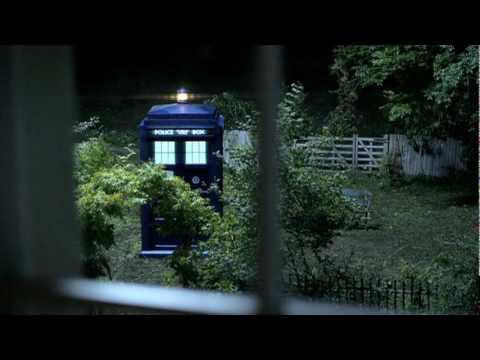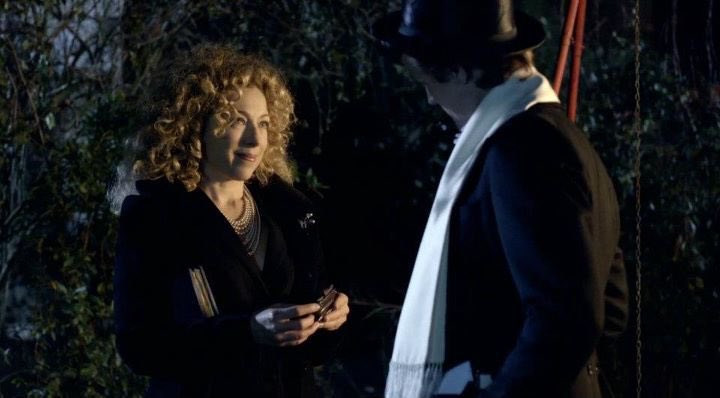“The Eleventh Hour” is certainly the most important script that Steven Moffat ever wrote.
Because he had to essentially prove to the general public that #DoctorWho could work without David Tennant.
Which is a Herculean task of itself.
#FishCustard
Because he had to essentially prove to the general public that #DoctorWho could work without David Tennant.
Which is a Herculean task of itself.
#FishCustard
It’s impossible to overstate how big a deal this was.
David Tennant WAS the Doctor to an entire generation in the way that Tom Baker was.
Indeed, it’s notable that Tennant was the only current Doctor to displace Baker at the top of official fan polls.
#FishCustard
David Tennant WAS the Doctor to an entire generation in the way that Tom Baker was.
Indeed, it’s notable that Tennant was the only current Doctor to displace Baker at the top of official fan polls.
#FishCustard
“Rose” has to prove that #DoctorWho was viable in the twenty-first century.
“The Eleventh Hour” has to prove that “Doctor Who” could survive the sort of creative and personnel changes that are largely unheard of outside of anthology shows.
#FishCustard
“The Eleventh Hour” has to prove that “Doctor Who” could survive the sort of creative and personnel changes that are largely unheard of outside of anthology shows.
#FishCustard
The difference is that even anthology shows are designed to undergo these changes on a regular basis.
Under Davies, and with Tennant, #DoctorWho had been one thing for four years and three seasons.
With “The Eleventh Hour” it had to become something completely different.
Under Davies, and with Tennant, #DoctorWho had been one thing for four years and three seasons.
With “The Eleventh Hour” it had to become something completely different.
It’s also worth noting that “The Eleventh Hour” was the first regular episode to air after “Journey’s End.”
“Journey’s End.” You know, the moment at which Davies made “Doctor Who” the biggest thing on television.
So, no pressure.
#FishCustard
“Journey’s End.” You know, the moment at which Davies made “Doctor Who” the biggest thing on television.
So, no pressure.
#FishCustard
“Amelia Pond. Great name. Like something out of a fairy tale.”
Moffat wisely retains certain elements from the Davies era; the present-future-past opening triptych, the three two-parters.
But he also immediately puts his own mark on it.
Moffat wisely retains certain elements from the Davies era; the present-future-past opening triptych, the three two-parters.
But he also immediately puts his own mark on it.
Davies positioned #DoctorWho at the point of intersection between soap opera and science-fantasy epic.
Moffat shifts the show to the junction of sitcom and fairy tale. Indeed, I suspect a large part of the hatred of the Moffat era is a rejection of that shift.
#FishCustard
Moffat shifts the show to the junction of sitcom and fairy tale. Indeed, I suspect a large part of the hatred of the Moffat era is a rejection of that shift.
#FishCustard
More to the point, the introduction of Amelia Pond establishes one of the big themes of the Moffat era - of the Matt Smith era in particular.
It’s fine to love #DoctorWho as an adult, but the show should always speak to children. (See also: Twelve’s closing speech.)
It’s fine to love #DoctorWho as an adult, but the show should always speak to children. (See also: Twelve’s closing speech.)
Amelia Pond is a staggering creation, by the way.
She nabs the title of “best companion” away from previous champion Donna Noble, and only reluctantly concedes it to Clara Oswald.
She’s such a great idea. The child who loved #DoctorWho.
#FishCustard
She nabs the title of “best companion” away from previous champion Donna Noble, and only reluctantly concedes it to Clara Oswald.
She’s such a great idea. The child who loved #DoctorWho.
#FishCustard
Interesting side note about “Doctor Who.”
My partners always preferred Tennant as the young and dynamic Doctor.
However, my older relatives, my mom and aunts, always preferred Matt Smith as the goofy Doctor.
My partners always preferred Tennant as the young and dynamic Doctor.
However, my older relatives, my mom and aunts, always preferred Matt Smith as the goofy Doctor.
“I can’t be six months late. I said five minutes. A promise.”
The Eleventh Doctor’s abandonment of Amelia Pond is a single defining character moment.
And unlike the Tenth Doctor’s “no second chances”, this approach to the character actively sticks.
It is the basis of his arc.
The Eleventh Doctor’s abandonment of Amelia Pond is a single defining character moment.
And unlike the Tenth Doctor’s “no second chances”, this approach to the character actively sticks.
It is the basis of his arc.
The Moffat repeatedly calls the Doctor out for his unreliability, for running away from his responsibilities, for failing those who depend upon him.
It’s fundamentally tied to the Moffat era’s interrogation of masculinity, by providing a clear journey.
#FishCustard
It’s fundamentally tied to the Moffat era’s interrogation of masculinity, by providing a clear journey.
#FishCustard
The Moffat era repeatedly suggests that a good man is one who stays, one who meets his obligations, one who is emotionally and physically present when those people around him need him.
It’s notable that Rory is the Moffat’s epitome of masculinity, because he’s always present.
It’s notable that Rory is the Moffat’s epitome of masculinity, because he’s always present.
This idea comes back in a different way in the Capaldi era, when the Doctor and Clara’s relationship fundamentally shifts after he abandons her in “Kill the Moon.”
The Twelfth Doctor comes to respect his “duty of care” to Clara, fundamentally tied to his neglegence to Amy.
The Twelfth Doctor comes to respect his “duty of care” to Clara, fundamentally tied to his neglegence to Amy.
“Why did you say six months?”
“Why did YOU say five minutes?”
That’s a beautiful moment. I actually remember being in the room with my family when that moment landed - just BAM!
It’s an incredible emotional whallop. The idea that the Doctor failed this lonely child.
“Why did YOU say five minutes?”
That’s a beautiful moment. I actually remember being in the room with my family when that moment landed - just BAM!
It’s an incredible emotional whallop. The idea that the Doctor failed this lonely child.
This failure defines the Eleventh Doctor in a way that no previous Doctor has been similarly defined.
It becomes the heart of his journey, and why “The Time of the Doctor” is an underrated masterpiece.
The Eleventh Doctor redeems himself by finally “staying for Christmas.”
It becomes the heart of his journey, and why “The Time of the Doctor” is an underrated masterpiece.
The Eleventh Doctor redeems himself by finally “staying for Christmas.”
“Who& #39;s Amy? You were Amelia.”
“Yeah? Now I& #39;m Amy.”
“Amelia Pond. That was a great name.”
“Bit fairy tale.”
This sets up another motif of the season and the Moffat/Smith era as a whole.
The Doctor’s absence as the death and return of an imaginary friend.
#FishCustard
“Yeah? Now I& #39;m Amy.”
“Amelia Pond. That was a great name.”
“Bit fairy tale.”
This sets up another motif of the season and the Moffat/Smith era as a whole.
The Doctor’s absence as the death and return of an imaginary friend.
#FishCustard
In case you don’t get that, the fifth season treats the cracks in time in the same way that the Davies era treated the Time War.
It was a metaphor for the void and chaos that existed between “Survival” and “Rose”, the yawning chasm of cancellation.
#FishCustard
It was a metaphor for the void and chaos that existed between “Survival” and “Rose”, the yawning chasm of cancellation.
#FishCustard
Moffat gets a lot of flack from certain segments of fandom for the way that he writes women.
This tends to gloss over the fact that Amy is very much a stand-in for Moffat.
A Scottish child who fell in love with the Doctor, and eventually helps resurrect him through imagination.
This tends to gloss over the fact that Amy is very much a stand-in for Moffat.
A Scottish child who fell in love with the Doctor, and eventually helps resurrect him through imagination.
The Moffat era becomes about sealing perceived gap that the Davies era (by necessity) enforces between the classic and new series.
Again, it’s notable that the cracks are caused by the destruction of the TARDIS. And that Moffat would later heal the Time War.
Again, it’s notable that the cracks are caused by the destruction of the TARDIS. And that Moffat would later heal the Time War.
“Oh, I’m getting it wrong again, aren’t I?”
Hey kids, it’s Oscar winner @OliviaColmanTV!
#FishCustard
Hey kids, it’s Oscar winner @OliviaColmanTV!
#FishCustard
“The Doctor in the TARDIS doesn’t know!”
One of the shallow criticisms of the Moffat era is that he writes brilliant men who always know everything.
In fact, a key motif of his #DoctorWho is that the Doctor doesn’t know as much as he thinks. And it often has dire consequences.
One of the shallow criticisms of the Moffat era is that he writes brilliant men who always know everything.
In fact, a key motif of his #DoctorWho is that the Doctor doesn’t know as much as he thinks. And it often has dire consequences.
To pick one example, the Doctor’s grandstanding and who in episodes like “The Pandorica Opens” and “A Good Man Goes to War” has dire consequences.
The Moffat era repeatedly rejects the idea of the Doctor as “the Oncoming Storm.”
#FishCustard
The Moffat era repeatedly rejects the idea of the Doctor as “the Oncoming Storm.”
#FishCustard
“Poor Amy Pond. Still such a child inside. Dreaming of the magic Doctor she knows will return to save her.“
“No, she& #39;s dreaming about me because she can hear me.”
Again, the Moffat era preemptively rejects the criticisms leveled by its most superficial critics.
“No, she& #39;s dreaming about me because she can hear me.”
Again, the Moffat era preemptively rejects the criticisms leveled by its most superficial critics.
Moffat consistently and steadfastly refuses to wallow in the idea that the Doctor’s failure has “broken” Amy or made her “lesser.”
Patient Zero tries to argue as much, and the Doctor immediately rejects that assertion.
Amy is a goddamn rockstar.
#FishCustard
Patient Zero tries to argue as much, and the Doctor immediately rejects that assertion.
Amy is a goddamn rockstar.
#FishCustard
“Oi, I didn& #39;t say you could go! Article fifty seven of the Shadow Proclamation. This is a fully established level five planet, and you were going to burn it? What? Did you think no-one was watching? You lot, back here, now.”
There, again, you have the nice restatement of theme.
There, again, you have the nice restatement of theme.
The Atraxi try to run away from their failures, to escape their responsibilities and avoid facing their obligations. And the Doctor immediately calls them on that BS.
But he still lacks the awareness to recognise that he does exactly the same thing.
#FishCustard
But he still lacks the awareness to recognise that he does exactly the same thing.
#FishCustard
“Sorry about running off back there.”
Again, it’s clear from the script that Moffat recognises this is a failure on the part of the Eleventh Doctor.
Even if the Eleventh Doctor is “not done yet.” After all, it’s no journey if the Doctor knows where he’s going.
#FishCustard
Again, it’s clear from the script that Moffat recognises this is a failure on the part of the Eleventh Doctor.
Even if the Eleventh Doctor is “not done yet.” After all, it’s no journey if the Doctor knows where he’s going.
#FishCustard
“You are asking me to run away with you in the middle of the night. It& #39;s a fair question. Why me?”
“I don& #39;t know. Fun. Do I have to have a reason?
“People always have a reason.”
“Do I look like people?”
“Yes.”
Another Moffat era theme established out of the gate.
#FishCustard
“I don& #39;t know. Fun. Do I have to have a reason?
“People always have a reason.”
“Do I look like people?”
“Yes.”
Another Moffat era theme established out of the gate.
#FishCustard
It’s clear that the Eleventh Doctor has his own motivations for taking Amy with him, because he’s curious about the cracks.
However, he lies to her. He treats her as a puzzle to be solved. And that is disastrous.
#FishCustard
However, he lies to her. He treats her as a puzzle to be solved. And that is disastrous.
#FishCustard
The Moffat era is fairly consistent on this point. Men should not treat women like puzzles to be solved.
See also: River, Clara.
It’s a potent and timely theme, on a number of levels, both narrative and social.
#FishCustard
See also: River, Clara.
It’s a potent and timely theme, on a number of levels, both narrative and social.
#FishCustard
Narratively, this rejection of the idea of treating women like puzzles is part of a broader conversation about how we consume stories in the internet age, treating them as combination boxes to be unlocked.
There are still strands of “Doctor Who” fandom that do that.
There are still strands of “Doctor Who” fandom that do that.
On a social level, a large part of Moffat’s #DoctorWho is about learning to be a good man.
And that means not treating women as puzzles or riddles, but people.
After all, look at the popularity of “The Game” around the early Smith years, which treated women as... well, games.
And that means not treating women as puzzles or riddles, but people.
After all, look at the popularity of “The Game” around the early Smith years, which treated women as... well, games.
I do think that “the Impossible Girl” arc is a little heavy handed in making this point.
Then again, there are apparently lots of people who could learn a lot from it.
But “The Eleventh Hour” establishes it as a theme right out of the gate.
#FishCustard
Then again, there are apparently lots of people who could learn a lot from it.
But “The Eleventh Hour” establishes it as a theme right out of the gate.
#FishCustard
Incidentally, the “Coming Soon” trailer at the end of “The Eleventh Hour” is fantastic, isn’t it?
It’s one of my favourite preview trailers ever, in large part due to the rhythm of it. (And the fact it has its own three-act structure.)
#FishCustard https://youtu.be/WVVVFFPt_oA ">https://youtu.be/WVVVFFPt_...
It’s one of my favourite preview trailers ever, in large part due to the rhythm of it. (And the fact it has its own three-act structure.)
#FishCustard https://youtu.be/WVVVFFPt_oA ">https://youtu.be/WVVVFFPt_...
I’m a big fan of symmetry in Moffat’s season structure. Not all his structural games work as well as they might, but mirroring the premiere and the finale is always a good one.
Both “The Eleventh Hour” and “The Big Bang” wrap up with the Doctor in Amy’s backyard at night.
Both “The Eleventh Hour” and “The Big Bang” wrap up with the Doctor in Amy’s backyard at night.
This is similar to the way the ninth season begins and ends with the resurrections of Skaro and Gallifrey respectively, sending the characters wandering through the catacombs beneath these would-be empires.
Symmetry! It’s great! It makes a story feel complete.
#FishCustard
Symmetry! It’s great! It makes a story feel complete.
#FishCustard
Anyway, “The Eleventh Hour” is still fantastic.
It’s comfortably up there with “Spearhead from Space” and “Rose” with great post-regeneration stories.
As with “Rose”, I’m always stunned by the quality of the dialogue here. It is such FUN. It’s so joyous.
#FishCustard
It’s comfortably up there with “Spearhead from Space” and “Rose” with great post-regeneration stories.
As with “Rose”, I’m always stunned by the quality of the dialogue here. It is such FUN. It’s so joyous.
#FishCustard
To be fair, a lot of the success of “The Eleventh Hour” is down to some shrewd production voodoo.
The story was shuffled later in the production story so that Matt Smith would have a chance to find his interpretation of the character before introducing us to the Eleventh Doctor.
The story was shuffled later in the production story so that Matt Smith would have a chance to find his interpretation of the character before introducing us to the Eleventh Doctor.
What’s interesting on some of the replies to this thread is how Moffat’s work on #DoctorWho still draws the attention of passionate haters even now.
Presumably drawn to the #FishCustard hashtag. Which seems quite petty and mean-spirited for a celebratory rewatch.
Presumably drawn to the #FishCustard hashtag. Which seems quite petty and mean-spirited for a celebratory rewatch.
((I have avoided any direct criticism of any non-Moffat writers in this thread, and made a point to avoid any unflattering comparisons, because this should be celebratory! Woot!
But it’s strange how praise of Moffat gets some people’s backs up.))
#FishCustard
But it’s strange how praise of Moffat gets some people’s backs up.))
#FishCustard

 Read on Twitter
Read on Twitter






